Before we had social media, television, or even the radio to get our news across, people still managed to distort the truth through spoken word. It’s a chastised habit that we often associate with narrow-minded adolescent girls, yet it is a far more prevalent practice than we would allow ourselves to believe. That’s right; I’m talking about gossip. Dating all the way back to the 17th century realm of colonial Massachusetts, The Scarlet Letter had its fair share of town gossips. These women, known as the magistrates, were responsible for the orchestration and public humiliation of wayward girl Hester Prynne. As punishment for her infidelity, Hester is forced by these magistrates, the clergy, and the townspeople to be branded with a scarlet “A” emblazoned in golden thread on the bosom of her garments that she must wear for the rest of her days. This serves, for her enforcers, as an effective penance and reminder of her sin. Yet are Hester’s mistakes any less a sin than that of those who condemned her? Or our own for that matter? Hester was an innocent, breathtaking youth begrudged to a loveless marriage, yet her society overlooked this back story in favor of dramatization and a skewed sense of the word “news.” The case is no different today. Manti Te’o has been besmirched and slandered by the public’s undying need to spread headlines without first deriving fact, and as a result his reputation will be forever marked by the scarlet “A” of insensitive jokes and hauntingly empty kiss-cams. The publicity and mocking of an innocent man’s mistakes has fueled the unforgiving side of our society and again shed light on our sensationalist ways. Yet if we were to put ourselves in Te’o or Hester’s shoes, we would not be so quick to judge. In school we are taught that gossip should not be bounced from every neighbor’s ear to ear, but in the real world we assume that just because we saw something scrolling along the bottom of the TV or on the front page of our internet provider its okay to retweet and repeat. But let us be reminded, next time, of how our own blunders would look if they were made into front page “news.” We never truly know the effects of what our gossip brings until someone is harmed in the aftermath. I leave you with a quote from Nathaniel Hawthorne’s Scarlet Letter.
“In our nature, however, there is a provision, alike marvelous and merciful, that the sufferer should never know the intensity of what he endures by its present torture, but chiefly by the pang the rankles after it…”
“The scene [is] not without a mixture of awe, such as must always invest the spectacle of guilt and shame in a fellow-creature, before society shall have grown corrupt enough to smile, instead of shuddering at it.”

